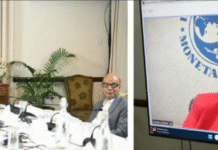Should nuclear play a part in the energy solution?

The world needs innovative energy solutions
Although the future of climate change is riddled with uncertainty, one fact is absolutely certain: The world needs innovative solutions to meet energy demand, while mitigating human impact on the climate.
There isn’t a one-size-fits-all answer to the climate challenge. Policy-makers seeking to meet our growing need for power must grapple with various solutions including carbon sequestration, circular carbon economies, nuclear power, and renewables.
The cost-benefit calculus varies: Each option comes with a set of challenges that call for closer inspection. Risks associated with nuclear power generation are, in many ways, different from the dangers linked to other energy sources — and increased risks warrant greater caution.
Lauded as a reliable carbon-free energy source, nuclear energy presents itself as a potentially viable bridge to fuel the global transition to renewables.
The question being posed by emerging powers faced with the option of developing nuclear power is: Are the risks associated with the growth of nuclear energy worth the contributions it can make to meet energy demand or address climate change? The short answer is: It depends.
Chernobyl and Fukushima fueled a visceral fear and anti-nuclear sentiment among the general public. That fear, in turn, impedes states’ ability to fund robust research and development both through investment vehicles and private-public partnerships.
Interestingly, the fear of going nuclear is almost universal: In China and India, a 2015 poll revealed that almost half the public supported the development of more renewables, about 25% supported the expansion of fossil fuels, and less than 10% supported the expansion of nuclear power.
Beyond public opposition, nuclear power also faces economic and technical limitations: Radioactive waste management, decade-long project cycles, uncompetitive costs, nuclear meltdown risks, and regulatory uncertainty.
The ability of states to exploit nuclear energy is informed by the geo-political trajectory of the individual state and, more importantly, its commitment to a rule-based global order.
Some processes used to produce civilian nuclear power can be converted to weapons: Dual-use uranium enrichment and plutonium as a byproduct of the reprocessing cycle. Therefore, any effort to seriously manage and sustain the growth of nuclear power on a global scale requires a commitment to a cooperative, multilateral framework.
The discrepancy in worldview between revisionist states, such as Iran and North Korea, and states committed to a rule-based global order calls for increased caution and nuance in analyzing nuclear power programs.
France and Sweden were among the first movers to adopt large-scale nuclear power. Both countries successfully decarbonized their grids and now emit less than a tenth of the world average of carbon dioxide per kilowatt-hour.
But what about the risks? Innovative technologies and protocols in the nuclear industry (ie pebble-bed reactors) have significantly minimized — and in some cases eliminated — issues of meltdown vulnerability, waste disposal, and uncompetitive costs.
Recently, the International Atomic Energy Agency (IAEA) found uranium particles at an undeclared site in Iran, a malign power which thrives on regional instability. When it comes to a commitment to a multilateral rule-based global order, Tehran’s track-record is, at best, dismal. Adding a nuclear dimension to Iran’s malign activities would entail devastating geopolitical implications.
By contrast, Saudi Arabia and the UAE are today pursuing peaceful civilian nuclear programs. Both nations have showcased an ironclad commitment to multilateralism, operational transparency, and a comprehensive safeguards agreement with the IAEA.
Effectively exploiting the potential for nuclear power growth would significantly propel both countries towards a cleaner, more diversified energy mix.
When balanced with its notable benefits, the problems associated with nuclear power do not render its growth too perilous to pursue. Policy interventions must supplement its growth by increasing support for nuclear research and development through sustained investments and private-public partnerships.
Robust support is crucial, but equally important is ensuring that policy implementation is inclusive of local communities — particularly by demystifying the science driving innovation in nuclear energy generation to quell anti-nuclear sentiments.
Sultan Althari is a Masters Candidate in Middle Eastern Studies at Harvard University’s Centre for Middle Eastern Studies and Student-Affiliate at the Kennedy School’s Middle East Initiative. This article previously appeared on Al Arabiya and has been reprinted by special arrangement.









